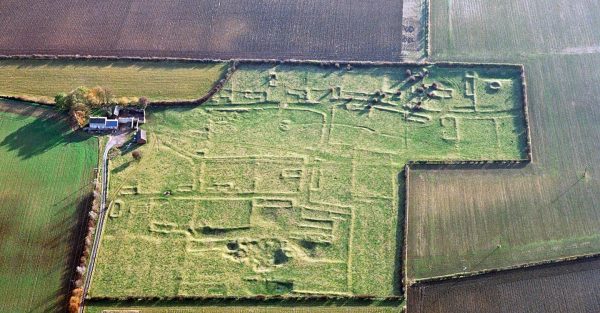Lost Villages and Legends by Jim Snee
 In the north of the county of Lincolnshire is a deserted medieval village called Gainsthorpe. It is one of the best examples in Lincolnshire, if not the country. While monitoring excavations for an electrical cable, I have looked over the gate into the field and felt as though I were looking into some sort of lost world.
In the north of the county of Lincolnshire is a deserted medieval village called Gainsthorpe. It is one of the best examples in Lincolnshire, if not the country. While monitoring excavations for an electrical cable, I have looked over the gate into the field and felt as though I were looking into some sort of lost world.
The reason for Gainsthorpe’s demise is uncertain, but in general, archaeologists talk about the disastrous events of the 14th century that broke the social bonds that kept villages like Gainsthorpe alive. Famine and plague left a reduced and weakened population that could not produce enough food or pay the rents. Landlords moved people out and reused the land for grazing sheep, securing an income, but losing the community. Local legend, on the other hand, has a much more prosaic explanation. According to legend, Gainesthorpe was not just a village but a nest of robbers, and that one fateful night the people of the surrounding villages rose up against it and burned it to the ground.
People wonder why legends spring up around abandoned places, but really it is a natural human reaction to uncertainty. We create a narrative where virtue is rewarded and vice is punished. Look at ancient Greek fables, medieval folk tales and even more modern narratives and you will find these same themes, often alongside a story of places that have vanished, been lost or only exist in the past. Indeed it has been alleged that the heritage industry is itself guilty of creating such a fantasy, although I view that as a reductio ad absurdum, an argument that has been stretched to a ridiculous degree.
There is also a rebellious part of me that responds to the arguments with questions. If we are recalling something in the past, that in many ways never truly existed, is that really such a bad thing. We live in the present, we anchor ourselves with the past that we see from our point of view, and thus steel ourselves for the future. And sometimes we indulge in a little make-believe. We put ourselves into that other world of the past to examine ourselves, or we bring the past into our present.
There are hundreds of examples over the centuries, mythical lands where headless people roam or daydreams are real. Storytelling, song, theatre and, in the last hundred years film, have allowed these escapes to be repeated over and over again. Things like A Connecticut Yankee in the Court of King Arthur or Brigadoon are more recent examples, but in all of these, the characters are really exploring themselves, not the past.
Lincolnshire doesn’t have a Brigadoon, although I am often tempted to create one, but it does have sites like Gainsthorpe, and hidden gems like Southery woods and Snipe Dales. Places where you can forget the modern world and think slow thoughts of ages gone by. These are the real Brigadoons of this world, places where you can reflect on life, and what truly matters.
Places where you can be your own legend.
